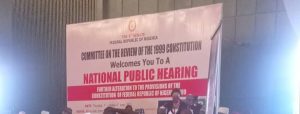Senate President, Ahmed Lawan, has said that the 1999 constitution cannot be replaced with an entirely new one except there are significant alterations made to section nine of the constitution.
Lawan said this while opening the National Public Hearing which held at the Abuja International Conference Centre on Thursday. He said that section nine of the constitution only made provision for members of the National Assembly to alter the constitution and provide the manner in which this could be done but did not make any such provision for the replacement or rewriting of the constitution.

He also said that he respected those who were of the opinion that the 1999 constitution should be replaced and stated that nothing could be done about their position because to replace the 1999 constitution would “amount to gross violation” of the Senate’s allegiance to it. Lawan said that nothing could be done about replacing the constitution until constitutional amendments were made to section nine of the 1999 constitution.
He said, “Some of our compatriots have urged that rather than amending the constitution, we should just make a new constitution altogether. We respect this opinion, no doubt and we believe it is a most desirable position, however, we are conducting this exercise in accordance with the extant view law which is the 1999 constitution.
“Specifically in section nine of the constitution empowers the national assembly to alter the provision of the constitution and prescribe the manner in which this would be done but unfortunately it does not make a similar position or provide a mechanism for replacing or rewriting an entirely new constitution.
“To embark on any process without prior alteration of section nine of the constitution to provide a mode through which a new constitution could be written will amount to gross violation of our own allegiance to the constitution. In other words, if we take the new constitutional amendments in section nine to be able to give Nigerians a new constitution. It will be unconstitutional to do otherwise.”
The issues which the public hearing focuses on include gender equity, the federal structure in governance, the local government administration, public revenue, fiscal federalism and revenue allocation, state policing, judicial and electoral reforms, the definition of residency and indigeneship, immunity for criminal cases, approved timeline for the assent of a bill and passage of the appropriation bill, states and local government creation, administration of the Federal Capital Territory, the constitutional roles for traditional rulers, the legislature and legislative bureaucracy and other issues that could promote unity and good governance.